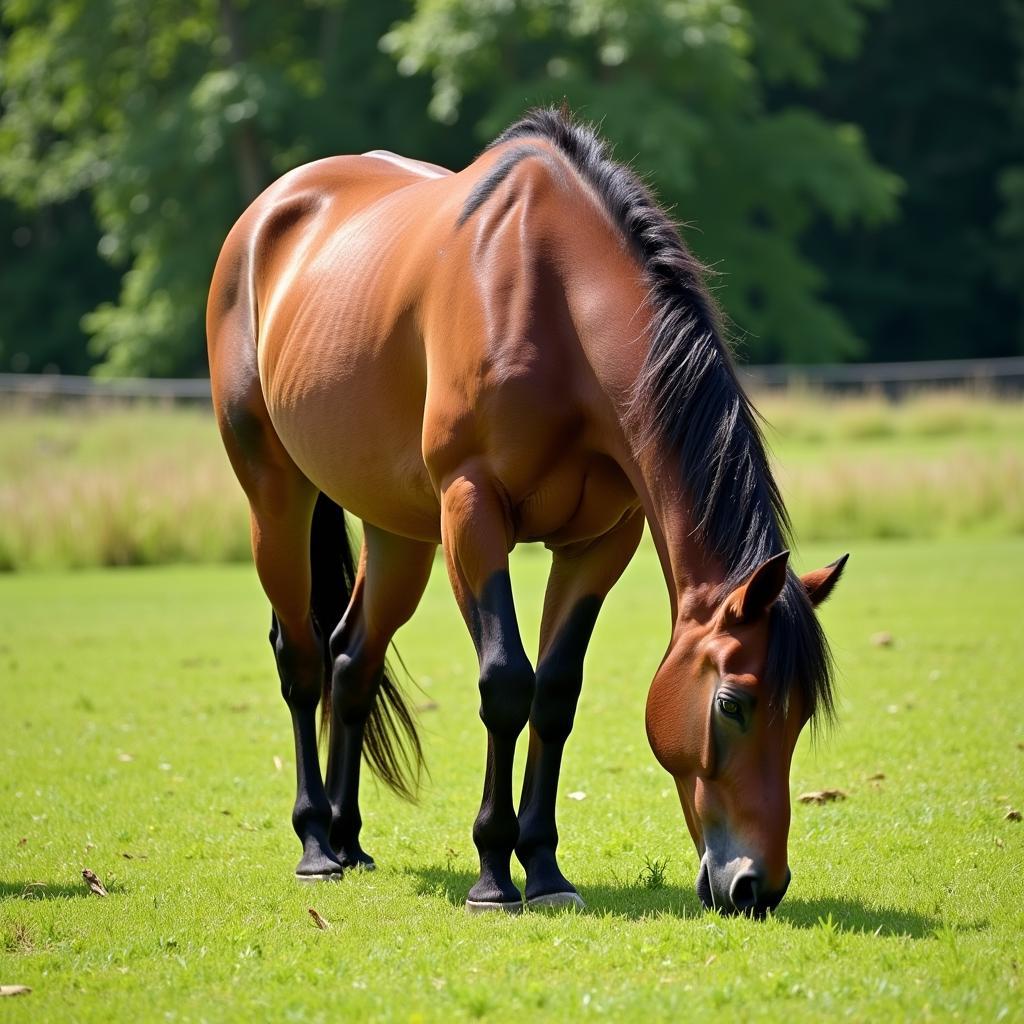Finding a Horse Cough Syrup Recipe that’s both safe and effective can be a challenge. A cough in horses can range from a mild annoyance to a sign of a serious respiratory issue, making it crucial to address it properly. This article will explore various home remedies and provide expert veterinary advice to help you understand and manage your horse’s cough.
Understanding the Causes of Equine Coughs
Before exploring horse cough syrup recipes, it’s vital to understand what’s causing the cough. Several factors, from allergies to infections, can trigger coughing in horses. Identifying the underlying cause is crucial for effective treatment. Common culprits include:
- Infections: Viral, bacterial, and fungal infections can all lead to coughing. Influenza, strangles, and pneumonia are examples of infectious diseases that commonly cause coughing in horses.
- Allergies: Just like humans, horses can suffer from allergies. Dust, mold, pollen, and other environmental irritants can trigger allergic reactions, leading to coughing, sneezing, and nasal discharge.
- Environmental irritants: Ammonia from urine, dust from hay, and other airborne particles can irritate the horse’s respiratory system, causing coughing. Poor stable ventilation can exacerbate this issue.
- Heaves (Recurrent Airway Obstruction): A chronic respiratory disease similar to asthma in humans, heaves is often characterized by a persistent cough, especially during exertion or in dusty environments.
Effective Home Remedies for Horse Cough
While home remedies can sometimes provide relief for mild coughs, it’s essential to consult with a veterinarian before administering any treatment. Some safe and commonly used home remedies include:
- Honey and garlic: These natural ingredients have soothing and antibacterial properties. Mix a small amount of honey and crushed garlic with warm water and offer it to your horse.
- Steam inhalation: Creating a steamy environment for your horse can help loosen mucus and ease breathing. Fill a bucket with hot water and add a few drops of eucalyptus oil (ensure the horse cannot reach the hot water). Drape a towel over the horse’s head and the bucket, creating a tent to trap the steam.
- Rest and hydration: Ensuring your horse has plenty of fresh water and adequate rest is crucial for recovery. Avoid strenuous exercise until the cough subsides.
When to Consult a Veterinarian
While home remedies can be helpful for mild coughs, it’s important to seek professional veterinary advice if:
- The cough persists for more than a few days.
- The cough is accompanied by other symptoms such as fever, nasal discharge, or difficulty breathing.
- The horse’s appetite or energy levels decrease significantly.
- The cough worsens despite home treatment.
Veterinary-Approved Horse Cough Syrup Recipes and Treatments
A veterinarian can diagnose the underlying cause of the cough and recommend the most appropriate treatment. This might include:
- Prescription cough suppressants: These medications can help control coughing and provide relief.
- Antibiotics or antifungals: If the cough is caused by a bacterial or fungal infection, antibiotics or antifungals will be necessary.
- Bronchodilators: These medications can help open up the airways and improve breathing, especially in cases of heaves.
- Corticosteroids: These drugs can reduce inflammation in the airways and alleviate allergic reactions.
 Veterinarian Examining a Horse with a Cough
Veterinarian Examining a Horse with a Cough
Preventing Equine Coughs
Preventing coughs is often easier than treating them. Here are some proactive steps you can take:
- Maintain good stable hygiene: Regularly clean stalls, remove manure, and ensure adequate ventilation to minimize dust and ammonia levels.
- Vaccinate your horse: Vaccinations can protect against common respiratory infections like influenza and strangles.
- Minimize exposure to allergens: If your horse has allergies, try to identify and avoid the triggers. Soaking hay can help reduce dust.
- Provide adequate nutrition and exercise: A healthy immune system is essential for fighting off infections.
Conclusion
Finding the right horse cough syrup recipe depends on the underlying cause of the cough. While home remedies can provide temporary relief for mild coughs, it’s crucial to consult a veterinarian for an accurate diagnosis and appropriate treatment plan. By taking proactive steps to prevent coughs and seeking professional advice when needed, you can help ensure your horse’s respiratory health.
 Healthy Horse in Pasture
Healthy Horse in Pasture
FAQ
- Can I give my horse human cough syrup? No, human cough syrup is not formulated for horses and can be harmful.
- How long does a horse cough typically last? The duration of a cough depends on the cause. Mild coughs may resolve within a few days, while more serious infections can last for weeks.
- What are the signs of a severe respiratory infection in horses? Signs of a severe infection include high fever, difficulty breathing, nasal discharge, and lethargy.
- Can horses get colds like humans? While horses don’t get the common cold, they can contract viral respiratory infections.
- Is it safe to ride a horse with a cough? It’s best to avoid riding a horse with a cough, especially if it’s accompanied by other symptoms.
- How can I improve stable ventilation? Ensure adequate airflow by opening windows and doors, using fans, and considering installing a ventilation system.
- What are some common allergens for horses? Common allergens include dust, mold, pollen, and insect bites.
Need further assistance? Contact us! Phone: 0772127271, Email: [email protected] or visit us at QGM2+WX2, Vị Trung, Vị Thuỷ, Hậu Giang, Việt Nam. Our customer care team is available 24/7.